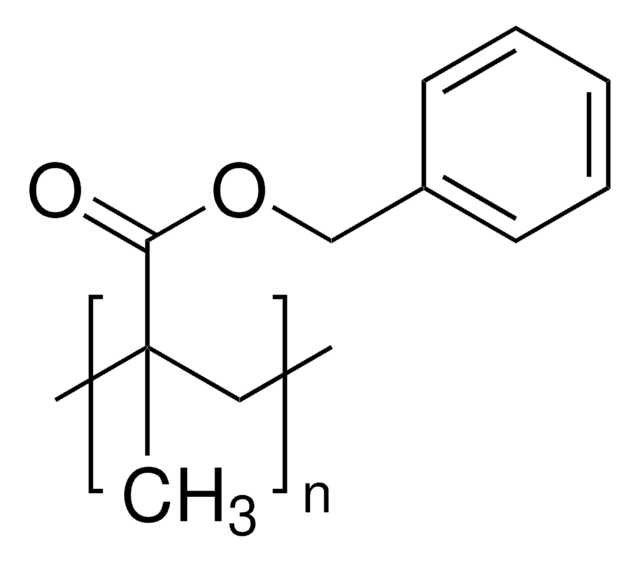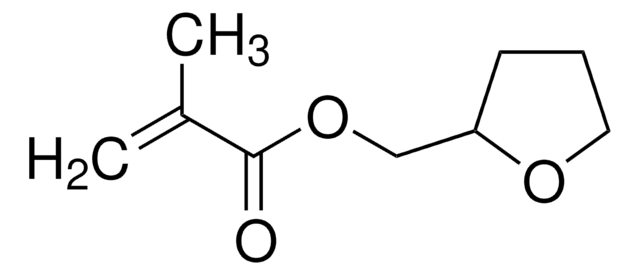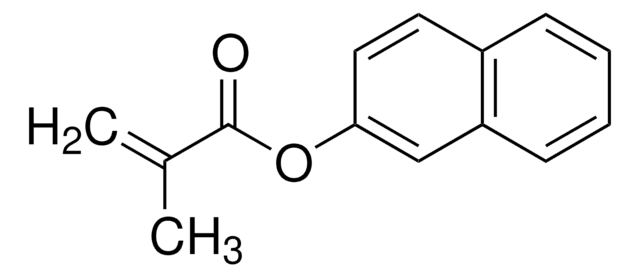409448
Benzyl methacrylate
96%, contains monomethyl ether hydroquinone as inhibitor
Sinónimos:
Benzyl α-methylacrylate, Benzyl 2-methylacrylate, Phenylmethyl 2-methyl-2-propenoate
About This Item
Productos recomendados
assay
96%
form
liquid
contains
monomethyl ether hydroquinone as inhibitor
refractive index
n20/D 1.512 (lit.)
bp
95-98 °C/4 mmHg (lit.)
density
1.04 g/mL at 25 °C (lit.)
SMILES string
CC(=C)C(=O)OCc1ccccc1
InChI
1S/C11H12O2/c1-9(2)11(12)13-8-10-6-4-3-5-7-10/h3-7H,1,8H2,2H3
InChI key
AOJOEFVRHOZDFN-UHFFFAOYSA-N
Categorías relacionadas
Application
- Statistical copolymers of benzyl methacrylate and diethylaminoethyl methacrylate: monomer reactivity ratios and thermal properties: The synthesis of poly(benzyl methacrylate) (PBzMA) and poly(diethylaminoethyl methacrylate) (PDEAEMA) statistical copolymers via free radical polymerization (Theodosopoulos, 2015).
- Poly (benzyl methacrylate)-poly triblock-copolymers as solid electrolyte for lithium batteries: Synthesis of a new type of BAB triblock copolymer based on benzyl methacrylate and oligo(ethylene glycol) methyl ether methacrylate for lithium battery electrolytes (Bergfelt et al., 2018).
- Dilute Solution Properties of Poly (benzyl methacrylate) in Ionic Liquids: Study on the dilute solution properties of PBzMA in various ionic liquids (Kharel et al., 2020).
- Synthesis and evaluation of benzyl methacrylate-methacrylate copolymers as pour point depressant in diesel fuel: Study on the effectiveness of benzyl methacrylate-methacrylate copolymers as pour point depressants in diesel fuel (Xie et al., 2019).
signalword
Warning
hcodes
Hazard Classifications
Eye Irrit. 2 - Skin Irrit. 2 - STOT SE 3
target_organs
Respiratory system
Storage Class
10 - Combustible liquids
wgk_germany
WGK 1
flash_point_f
224.6 °F - closed cup
flash_point_c
107 °C - closed cup
ppe
Eyeshields, Gloves, type ABEK (EN14387) respirator filter
Certificados de análisis (COA)
Busque Certificados de análisis (COA) introduciendo el número de lote del producto. Los números de lote se encuentran en la etiqueta del producto después de las palabras «Lot» o «Batch»
¿Ya tiene este producto?
Encuentre la documentación para los productos que ha comprado recientemente en la Biblioteca de documentos.
Los clientes también vieron
Nuestro equipo de científicos tiene experiencia en todas las áreas de investigación: Ciencias de la vida, Ciencia de los materiales, Síntesis química, Cromatografía, Analítica y muchas otras.
Póngase en contacto con el Servicio técnico













